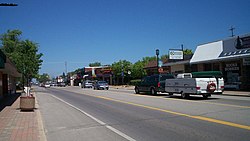
The following is a description of unincorporated communities in Michigan. The U.S. state of Michigan contains numerous unincorporated communities, which are communities outside of the boundaries and jurisdiction of an incorporated municipality.
Description
edit

The state of Michigan contains only two forms of incorporated municipalities: cities and villages.[1] The state contains 1,240 townships, which consist of charter townships and civil townships. Townships are the state's only form of unincorporated municipalities.[2] Unincorporated communities can only be located in townships and not within the boundaries of an incorporated village or city. Unincorporated communities lack their own self-governance, as well as having no formal boundaries or population statistics, and they are administered entirely by the township(s) in which they are located.
Michigan also has 212 census-designated places (CDP) according to the 2020 census.[3] By definition, all CDPs are also unincorporated communities, and a defined CDP may also have other unincorporated communities within its boundaries. Being recognized as a CDP does not give the community any legal autonomy reserved for municipalities, as the designation is merely a collection of population statistics within a defined area used by the U.S. Census Bureau.[4] Three unincorporated communities also serve as a county seat—Atlanta, Eagle River, and Mio—although this designation does not give any legal autonomy and is merely the location of the county's seat of government.
With a few noted exceptions, all unincorporated communities included are those that have an active Geographic Names Information System (GNIS) identification listing the location as a populated place or census-designated place.[a] Many unincorporated communities have an active U.S. Post Office that may serve a much larger area, while many more communities have had historic post offices. In instances where a community is located along county lines and has portions in more than one county, it might be listed more than once. These articles only pertain to present-day communities that are listed by the GNIS and do not include ghost towns, although some unincorporated communities may no longer have a permanent population or any remaining structures. For communities that may also be classified as ghost towns, see the list of ghost towns in Michigan.
There are some examples of incorporated villages and cities losing their incorporated status and returning back to an unincorporated community. Two prime examples are neighboring Oscoda and Au Sable, which forfeited their incorporated status in 1919 and 1930 respectively after their populations declined significantly following a series of devestating fires. A similar example is the former village of Sherman. Many other unincorporated communities have disappeared completely after they were absorbed into nearby incorporated village or city boundaries. If an unincorporated community has significant history, it may also be recognized by the state as a Michigan State Historic Site (e.g. Emerson, Epoufette, Prudenville) or nationally recognized on the National Register of Historic Places (e.g. Assinins and Idlewild). Bay View is the only unincorporated community in the state to be recognized as a National Historic Landmark.
Lists of unincorporated communities
edit- List of unincorporated communities in Metro Detroit
- List of unincorporated communities in Northern Michigan
- List of unincorporated communities in Southern Michigan
- List of unincorporated communities in the Upper Peninsula
See also
edit- Administrative divisions of Michigan
- List of census-designated places in Michigan
- List of counties in Michigan
- List of municipalities in Michigan
Notes
edit- ^ Beaver Island, Branch, Harsens Island, North Street, Ottawa Lake, and University Center do not have a GNIS identification number, but they do have their own active post office. They are the only defined unincorporated communities in the state to have a post office and distinct ZIP Code but no GNIS identification number for the community itself.
References
edit- ^ "Organization of City and Village Government in Michigan" (PDF). MML.org. Michigan Municipal League. January 2016. Retrieved 28 July 2020.
- ^ Michigan Townships Association (2021). "Townships in Michigan". Retrieved December 21, 2022.
- ^ U.S. Census Bureau (2020). "State of Michigan Census Designated Places". Retrieved December 9, 2021.
- ^ Census Reporter. "Glossary: Census Designated Place (CDP)". Retrieved December 10, 2021.
Further reading
edit- Romig, Walter (October 1, 1986) [1973]. Michigan Place Names: The History of the Founding and the Naming of More Than Five Thousand Past and Present Michigan Communities (Paperback). Detroit, Michigan: Wayne State University Press. ISBN 978-0-8143-1838-6.
